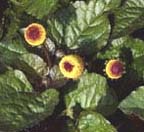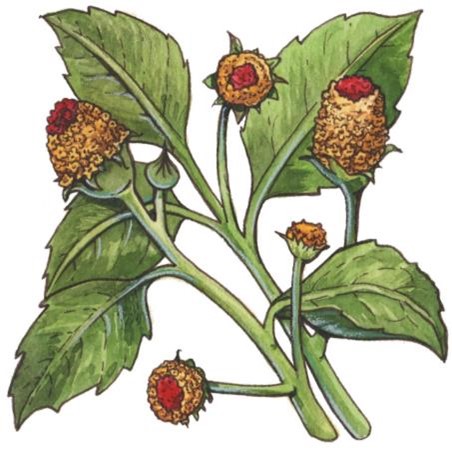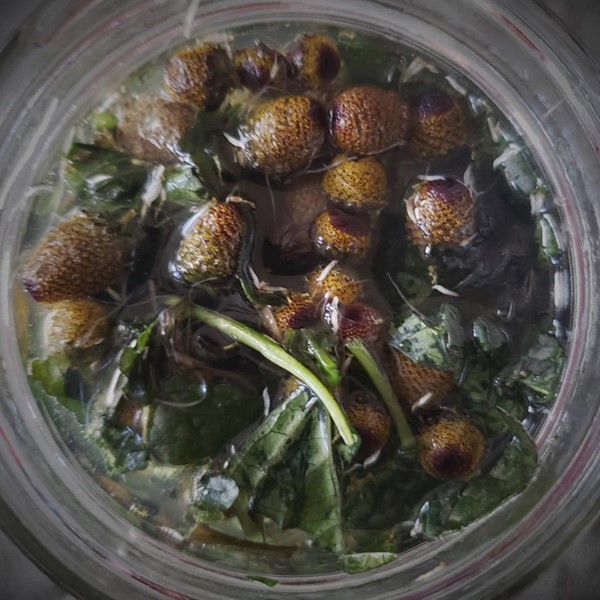 Spilanthes acmella
Spilanthes acmellaToothache Plant
Spilanthes, commonly called toothache plant and sometimes referred to as acmella, paracress, or eyeball plant, never ceases to impress. Used for centuries in India, Africa and South America, this lover of warm, sunny climates is the quintessential plant for tooth and gum health. Popping merely a portion of this herb into your mouth will kick your salivation glands into overdrive, as a pleasant, cooling-yet-spicy tingle spreads throughout mouth, gums, teeth and tongue. Its flowers are easily identified, starting as yellow buttons with a red circular center, and grow into small, truncated cones that look like very compact pompoms.
 We love giving a piece of flower – no larger than a small pencil eraser - to folks skeptical about the potency of herbs. We make sure to warn them and hand them a spit cup first (we're really not kidding about the salivation part), and eventually a panoply of surprised, impressed and amused facial expressions (and some spitting) results. You don't have to wait for it to reach a particular stage of development before it can be harvested. You can pick leaves at any time, although the flowers are the strongest part of the plant. It is non-toxic.
We love giving a piece of flower – no larger than a small pencil eraser - to folks skeptical about the potency of herbs. We make sure to warn them and hand them a spit cup first (we're really not kidding about the salivation part), and eventually a panoply of surprised, impressed and amused facial expressions (and some spitting) results. You don't have to wait for it to reach a particular stage of development before it can be harvested. You can pick leaves at any time, although the flowers are the strongest part of the plant. It is non-toxic. As if the above wasn’t reason enough to start growing some, Spilanthes also contains potent antifungal, antimicrobial, and antimalarial properties. This herb enhances the immune system's resistance to infections and stimulates wound healing. It has been used in many places as a local anesthetic, as treatment for snakebites in parts of Western Africa, for vaginal maladies and menstrual regulation in eastern India and Bangladesh, for coughs and respiratory ailments in Brazil, and as a general antipyretic – aka fever reducer – all around.
A spicy, protective herb which stimulates testosterone production, some place its magical correspondence within the domain of Mars. Others say Luna rules it, noting its saliva production, pervasive use as a wound wash, as well as its anti-inflammatory properties. Others believe its dental usage and general anesthetic qualities place it within Saturn's domain.
Spilanthes is easily tinctured (see Anthony & Aleia's starting tincture of leaves and flowers pictured below) and can also be consumed as a tea. We use our alcohol-based spilanthes tincture as a mouthwash. Simply place a drop or two into a tablespoon of water then swish, gargle, and spit. Be warned that ingesting too much of this plant can be a bit overwhelming and can trigger constant swallowing and uncomfortable salivation. Be gentle and start small!

How to Grow Spilanthes/Toothache Plant
Surprisingly simple to grow, the seeds germinates in 7-12 days at temps of 70-90 F. If starting indoors, use peat pellets and a plant heat mat/heating pad (as needed). Spilanthes can be grown in a pot, but make sure to pot it up regularly so it doesn't get cramped. It needs full sun to partial shade, rich soil, and plenty
of fertilizer. Since it expands its territory by sending out branches
that root in the ground, look for one of these rootings, cut it from the
main plant, and pot it up to propegate. Relatively short (you’ll rarely see one taller than 18 inches) they love rich soil and room to sprawl. General
growing info
Spilanthes acmella
Toothache Plant
100 seeds $4.00
Uses
in Witchcraft & Magic:
Mars/Moon/Saturn Herb
Purification
Energizing/Stimulating
© 2021-2024 Alchemy Works; No reproduction without permission